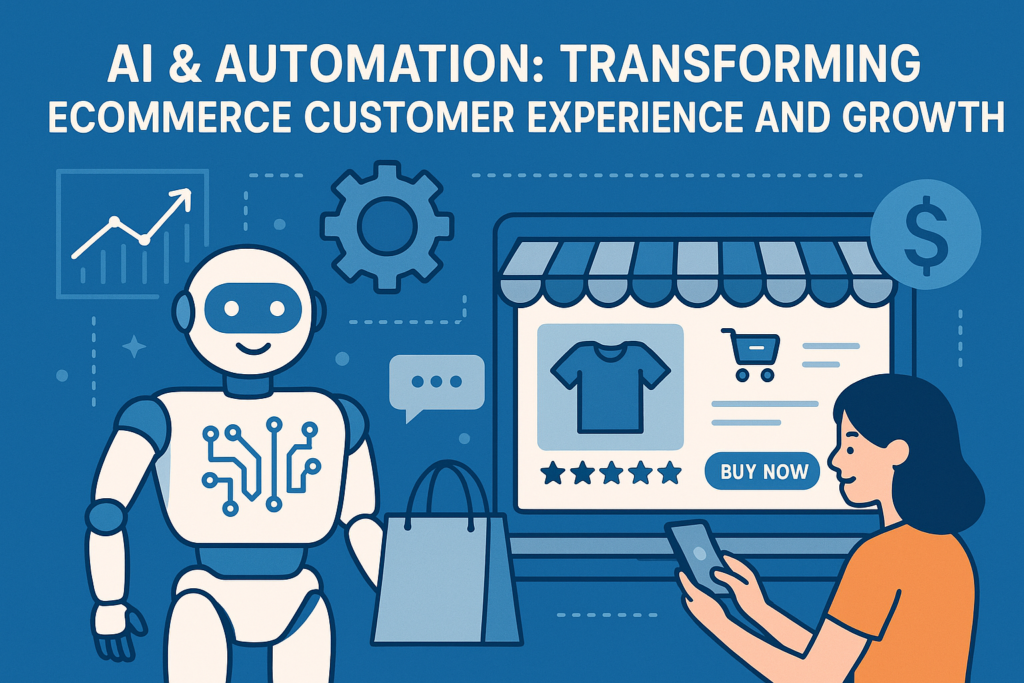The eCommerce landscape is evolving faster than ever before, driven by the rise of Artificial Intelligence (AI) and automation. Today’s online businesses are no longer competing on just price or selection; they are competing on experience, personalization, and speed.
In this blog, we’ll explore three major ways AI and automation are revolutionizing eCommerce:
- How AI Chatbots are transforming customer service,
- How Predictive Analytics helps forecast sales,
- How Personalized Marketing Automation drives conversions.
Let’s dive in.
🤖 How AI Chatbots Are Revolutionizing Customer Service in eCommerce
Customer service is often the first direct touchpoint between your brand and a shopper—and AI-powered chatbots are redefining this interaction.
What Are AI Chatbots?
AI chatbots are intelligent virtual agents powered by natural language processing (NLP) and machine learning algorithms. They can understand user queries, provide instant responses, and even complete tasks like order tracking, refunds, or product recommendations without human intervention.
Benefits of AI Chatbots:
- 24/7 Availability: Unlike human agents, chatbots work round-the-clock to assist customers in different time zones.
- Instant Responses: Reduces wait time, improving customer satisfaction.
- Cost-Efficiency: Reduces the need for large customer service teams.
- Personalization: Bots can pull customer history, preferences, and recommend products in real time.
- Scalability: During peak seasons, chatbots handle thousands of conversations simultaneously.
Example:
A fashion eCommerce store can deploy a chatbot that not only answers queries like “Where is my order?” but also recommends accessories based on a customer’s past purchases.
Pro Tip: Use AI chatbots integrated with live agents for complex queries—this creates a seamless handover when needed.
📊 Predictive Analytics: Forecasting Sales with Machine Learning
Accurate forecasting is the backbone of smart inventory management, targeted marketing, and strategic planning.
What is Predictive Analytics?
Predictive analytics uses machine learning models to analyze current and historical data to make predictions about future outcomes—like sales trends, customer churn, or inventory demands.
Applications in eCommerce:
- Sales Forecasting: Predict how much stock you’ll need next season based on past buying patterns.
- Demand Planning: Anticipate which products will become popular based on customer behavior, trends, and external factors (e.g., holidays, weather).
- Dynamic Pricing: Adjust product prices in real-time based on demand forecasts.
Benefits:
- Minimize Stockouts and Overstocks: Maintain optimal inventory levels.
- Data-Driven Marketing: Target customers based on predictive scores (likelihood to buy).
- Boost Profit Margins: Smarter inventory means lower holding costs and better cash flow.
Example:
An electronics retailer can predict a spike in headphone sales every June due to summer vacations, and plan inventory and marketing campaigns accordingly.
Pro Tip: Combine predictive analytics with real-time dashboards to make agile business decisions.
🎯 Personalized Marketing Automation for Increased Conversions
Generic marketing no longer works. Shoppers expect personalized experiences tailored to their preferences and behaviors—and AI is making this easier than ever.
What is Personalized Marketing Automation?
It’s the use of AI and automation tools to deliver customized marketing messages—emails, SMS, push notifications, and ads—based on individual customer data such as browsing history, purchase behavior, and engagement patterns.
Benefits:
- Higher Conversion Rates: Personalized emails generate 6x higher transaction rates compared to non-personalized ones.
- Better Customer Loyalty: Shoppers appreciate brands that “know them” and recommend relevant products.
- Reduced Cart Abandonment: Automated, personalized reminders help recover lost sales.
Applications:
- Dynamic Product Recommendations: Show “You might also like” sections based on past browsing and purchase data.
- Abandoned Cart Emails: Remind customers of products they left behind, with personalized incentives.
- Behavior-Based Triggers: Send birthday offers, loyalty rewards, or back-in-stock notifications tailored to the user.
Example:
An online bookstore could automatically recommend a thriller novel to a user who previously bought detective fiction and mystery novels, increasing the likelihood of repeat purchases.
Pro Tip: Use AI-powered customer segmentation to create even more targeted campaigns based on real-time behaviors.
🚀 Final Thoughts
AI and automation aren’t just “nice-to-have” anymore—they are mission-critical for future-proofing your eCommerce business.
By integrating AI chatbots for smarter service, leveraging predictive analytics for sharper forecasts, and using personalized marketing automation to boost conversions, eCommerce brands can deliver exceptional customer experiences that drive loyalty and growth.
Need help integrating AI into your eCommerce platform?
At [Your Company Name], we build intelligent, scalable solutions that bring your brand closer to your customers—with automation at the core.






Leave a Reply